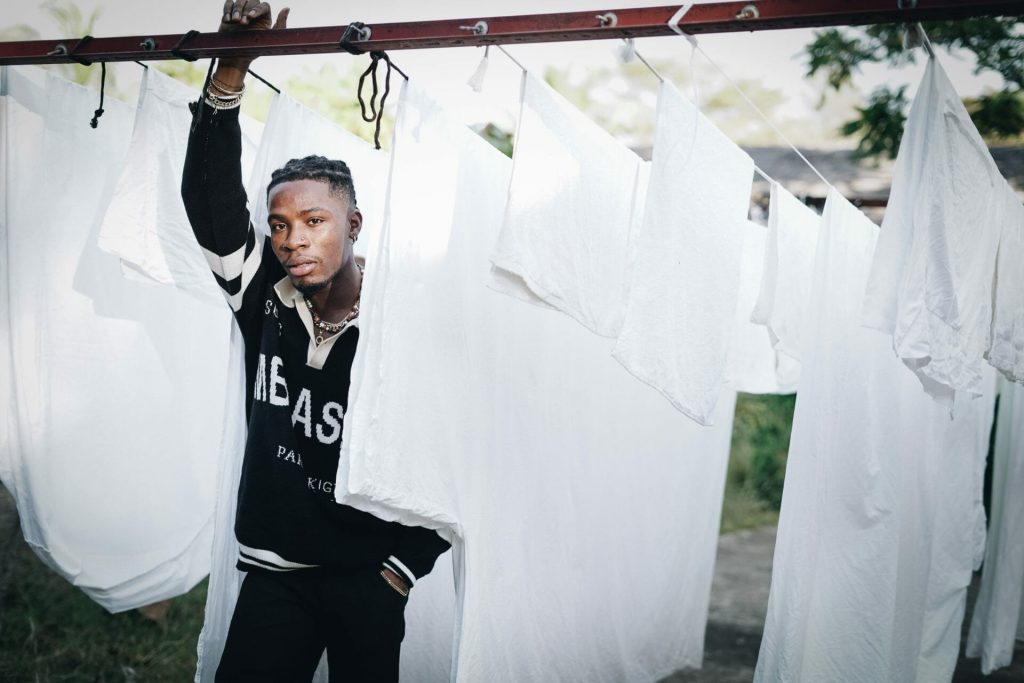
The second album from 25-year-old Nigerian Afrobeats sensation Joeboy is wrapped and ready for its spring 2023 release—or is it? “I recorded a great song yesterday, and it sounds like a hit to me. It’s called ‘Duffel Bag’—as in a duffel bag full of money or a lot of money,” he says with a chuckle, while calling from his palatial bedroom in Lagos. “I’ve been working on this album since the beginning of 2022, and I keep recording songs because I’m experiencing new things. So there may be a few tracks that I swap out for newer ones.”
It’s hard to blame him for keeping the gates open to his forthcoming LP Pon Deck, which, as of the fall of 2022 at least, is filled with 14 deeply rhythmic but lightly bouncing Afrobeat jams—all set aloft by Joeboy’s smooth, fluid singing and his jaw-dropping knack for a memorable melody. The singer-songwriter has experienced a meteoric rise through the densely packed pan-African pop scene since his first hit in 2019, and his cuts have already been streamed hundreds of millions of times around the world. Today, more than 2 million people follow him on Instagram and another million on TikTok, where his songs have inspired trending dances and glowing adoration.
What’s behind all the fame and followers? Bottom line: Joeboy makes music that feels really damn good. And he knows it.
“When you hear my music, I want you to feel those good vibes. No matter if you’re down, sad or depressed, I want you to hear a Joeboy song and feel lighter,” he says, as if he’s prescribing medicine for the soul.
Joeboy grew up in Lagos, in awe of universal stars like The Weeknd and Michael Jackson, aware of the power of a perfect pop song. At the age of 17, he recorded his first tune—he cringes a bit talking about it, but it can still be found on YouTube—before enrolling at a university to study human resource management. Concurrently, he began dropping Nigerian-influenced covers of American pop songs on YouTube, a tactic that expanded his fanbase exponentially. One of those covers danced into some important ears: Mr Eazi, the head of record label/collective emPawa and an Afrobeats superstar in his own right.
“I was living at home at the time, my second year in university. I remember I was praying for my exams to go well. I got this message from Eazi and, honestly, I thought I was being pranked—friends trying to get me not to focus,” Joeboy says. “I couldn’t believe my eyes. That was one of the most important days of my life.”
Joeboy’s career could’ve taken off right then and there, but he also knew he needed to finish school first. He took his third and fourth years in university to focus dually on studying and writing increasingly hooky Afrobeats jams, honing his melodies and lyrics to capture sweeping, swooning romance and club bangers alike. When the time was right, sure enough, the world was served to Joeboy and just a few months after graduating, in 2019, he released “Baby.”
“It was like the universe was waiting for me to finish school,” he says with a laugh. “We didn’t even see it coming. That song was so big, and it’s still growing today. It’s one of those evergreen songs. It took a few months to blow up here in Nigeria, but across Africa, it was so popular. It got to No. 1 in Uganda; I’d never been there at the time.”
Throughout 2020 and 2021, Joeboy toured across his home continent, releasing tons of music, including his official debut, Somewhere Between Beauty & Magic. In a year, he has transformed from a self-serious but ambitious student to a continent-wide superstar, coming off like an eager kid brother to global icons like Burna Boy and Wizkid.
His life became wilder, but also more complicated—he could no longer hang out in public with his friends, or dance anonymously at a club. (He says he’ll “pull up my shades and zone out” when he needs a breather.) Simultaneously, Joeboy began to realize the spiritual nature of music making, feeling as if the melodies flowing out of his brain weren’t necessarily even his property—they were coming from somewhere else.
“Music is the sound of the universe,” he says. “I don’t think anyone gets to keep a sound as theirs; it’s not from us. These songs come from the soul of the universe, and we are just vessels. We don’t own anything.”
That mindsest carried him into the long—and, arguably, ongoing—process of creating Pon Deck. The collection builds upon the breezy, tropical, hip-moving tunes that populate his debut; the sounds are bigger, the choruses are juicier and the emotional releases are all the more potent. He named the record after his tag—“Joeboy Pon Deck!,” which translates to “Joeboy is Here!” And listening to these endlessly catchy songs, one can sense the truth in the advertising.
Joeboy says he feels blessed to be part of a growing movement bringing West African music to the global forefront.
“Look, this period is one of the greatest in the history of Afrobeats. Global attention is on us, and there are so many amazing artists; the industry here is super competitive. The videos, the models, the fashion—the whole entertainment industry in Lagos is just blooming. And it’s going to get way bigger from here,” he says confidently. “Right now, our biggest export is crude oil. In the next few years, that’s all going to change. Our music is going to be everywhere.”
